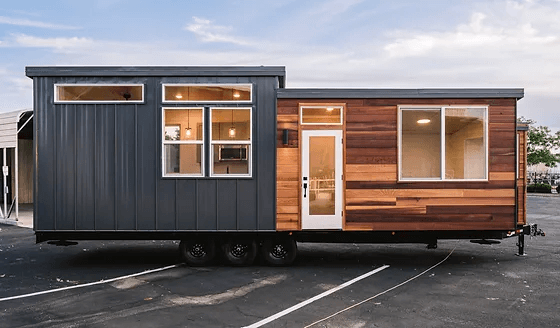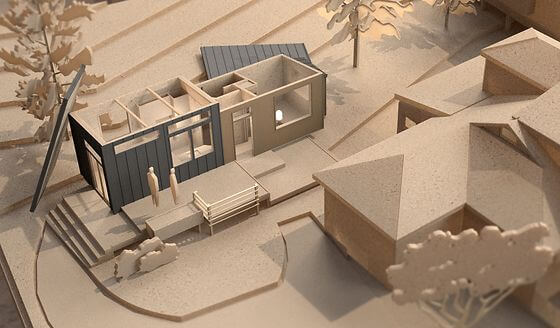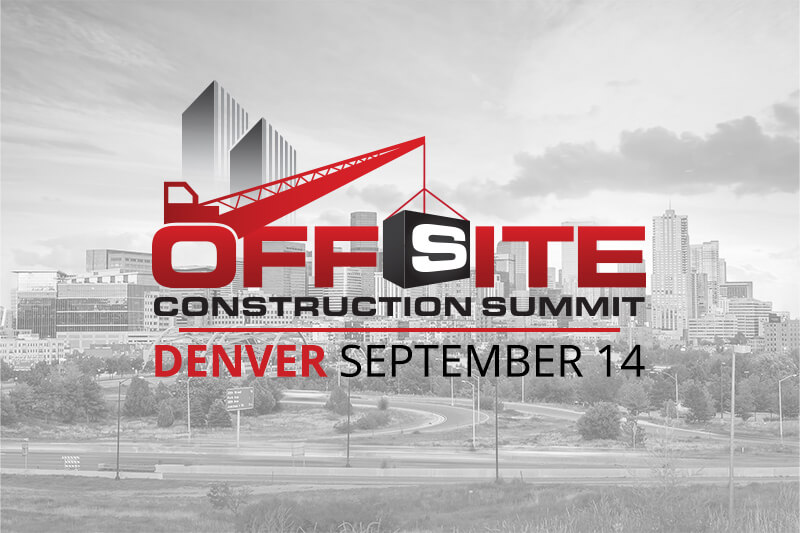Tiny Homes Can Now Be Permanent Residences in Colorado
An exclusive article from the Offsite Construction Network
Previously considered only a part-time or seasonal option, Colorado residents can now legally live in a tiny home and consider it their full-time residence.
HB22-1242, just passed by the Colorado General Assembly, makes it possible for tiny houses—even those on wheels, as opposed to a permanent foundation—to be considered much as manufactured houses are now; that is, if they are suitable to be connected to utilities and pass state inspection, then they can be considered full-time legal residences.
“The issue involved here is that tiny homes on temporary foundations, or on wheels, were regulated like RVs,” says Colorado State Representative Cathy Kipp. “With RVs, legally, you aren’t allowed to live in them for more than 31 days consecutively. So, people who wanted to live in tiny homes as a permanent way of life didn't really have a legal option.”
How Tiny Homes Can Make a Big Difference
Though seemingly a small alteration to the way tiny homes are governed, this new rule allows for potentially big changes in the way Colorado residents can find housing.
“We have a housing crisis in Colorado right now,” says Kipp, “and we have a housing crisis probably everywhere in the United States. And I think having all of these options available when you have a shortage of housing is an important way to go in our state. In Colorado, we've passed a lot of different housing legislation to try and give people as many options as possible.”
So, how much of an impact will this bill have on those looking for housing in Colorado? Kipp believes it will be substantial.
“I know that it will give many people a more affordable entry point into housing and a way for some people to downsize, which will free up housing for other people,” she says. “Some areas are also hoping to form tiny home communities in order to try and get people out from homelessness. So, an entry point to get from being on the street to being in some kind of housing, and maybe that's transitional to get to something else.”

Tiny Home By Vesta Modular. Prior to the passing of HB22-1242 in Colorado, tiny houses such as these weren't allowed to be permanent residences, Now, tiny houses with wheels and other temporary foundations can be lived in year-round.
Bi-Partisan Support for Tiny Homes in Colorado
With housing being such an important—and visible—issue for Colorado, support for this bill was critical. Thankfully, Kipp and her fellow bill co-sponsors were able to bring both sides of the Assembly aisle together. And once there was agreement on the mission, the details fell into place.
“We had bipartisan sponsors on this bill,” says Kipp. “Everybody sees the need for housing, and I think we walked a good line. Basically, we followed the statutes for our mobile homes because they were essentially more or less in the same category. So, we essentially moved tiny homes into that same area. I think we've ended up in a good place.”
HB22-1242 went into effect July 1, 2023, and state inspectors aren’t wasting time. “Building officials around the state are getting themselves into gear,” says Kipp, “to make sure that people have a safe and legal way to live in these houses.”

Tiny Home 3D Model by California Tiny House Inc

Connect with the Offsite Construction Industry in Colorado
Join Manufacturers, Designers, Developers & More in Denver, September 14, 2023
Presented by the Offsite Construction Network, the Offsite Construction Summit will be live in Denver, CO in September to offer all attendees a focused presentation of the abilities of offsite construction across all markets. Featuring 9 speakers covering a wide range of offsite topics including "embracing new market demands", the "advantages of mid-sized projects", and more!
Bringing In the Tiny Home Industry
“We had several meetings with the tiny home community,” says Kipp. “In the beginning, I think there was some concern among the tiny home community that we were going to overregulate, and, of course, there's always nervousness when change comes. But we had a lot of long conversations. In the end, I think we were all excited to have a path to where everybody in Colorado could live in tiny homes legally.”
Tackling the Larger Issue of Housing
While the passage of HB22-1242 is great news for those considering tiny homes as a permanent residence, there’s plenty of work left to be done to tackle homelessness and housing affordability in Colorado.
“We've done a lot,” says Kipp of the work being done by the Colorado General Assembly, “and there's a lot of steps we have left to take. We've invested a significant amount of the pandemic dollars, which came from the federal government, into dealing with the housing crisis. We’ve taken steps to make sure that people can stay in their mobile homes. And the support for more innovative types of housing—middle-income housing, low-income housing, the whole gamut—continues to grow.”
“It's become such an issue and so many people are working on affordable housing for their workforces, for teachers, for other people who do service jobs in the community. There's just so many different needs out there, and we want the people who work in our communities to be able to live in those communities and not have to just commute because that's all they can afford to do.”
“At the end of the day,” concludes Kipp, “we want people to have safer and legal housing options that they can take advantage of and a good entry point into housing for people who struggle with the affordability issue.”
About the Author: John McMullen is the marketing director of the Offsite Construction Network You can contact him at mcmullen@hardimanwilliams.com
Upcoming 2026 Offsite Construction Network Events
Join the leading companies and professionals from across the offsite construction industry at each of this year's Offsite Construction Network events. With summits and expos taking place across North America in 2026, it's never been easier to connect with and learn from offsite construction manufacturers, designers, builders, and suppliers from the United States and Canada.
Subscribe today to get the latest updates on future events from the Offsite Construction Network.

Toronto
June 4

Denver
September 10
